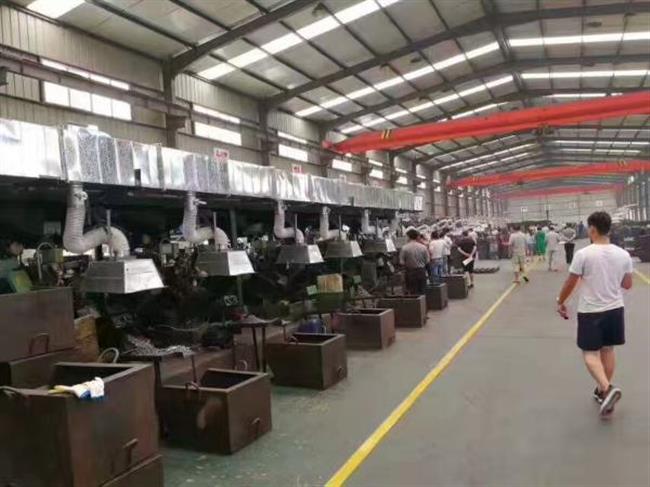Battle against pollution in China's "nuts and bolts" capital

A metal components factory in Yongnian, Hebei Province.
A four hour drive south from Beijing is Yongnian, the nation's largest production base of nuts, bolts and other metal components.
Metal parts factories began to gather in Yongnian, Hebei Province in the 1960s. In May there were 11,054 companies and over 340,000 people working in the production and sales of metal components.
Thirty years ago when Zhao Yongliang was born in Yongnian, his father was running a factory from his home, hiring several workers to churn out thousands of bolts a day.
Zhao inherited the factory from his father, but found the old way of living increasingly challenged by the need to tackle the foul air in his hometown.
When producing the components, workers used acid substances to clean the components, while haphazard disposal of cleaning agents polluted the environment. Volatile organic compounds, also a type of air pollutant, are generated during electroplating. Grease is also a big problem.
In April, environment inspectors dispatched by the Ministry of Environmental Protection visited Yongnian and criticized the local government for their failure to clean up "scattered, chaotic and polluting industries" that had taken root in Yongnian.
"The nuts and bolts industry has been a lifeline for people, so the battle against pollution will be very hard fought," said Dong Maotong, head of the Yongnian Standard Components Association.
Yongnian's output of nuts, bolts and other components in 2016 was 2.89 million tons, about 45 percent of the national total, according to the association. The total value was 20 billion yuan (about 5.8 billion U.S. dollars).
In a report to ministerial environment inspectors, Yongnian district government used strong language to show they meant business on emissions standards.
"We should rip open the face, use a strong hand, and harbor a resolution like brave men who cut open wrists to let out snake venom. We will meet the environment standards in the shortest possible time," the report said.
The head of Yongnian district government was named commander for the battle against pollution, and government staff were divided into different sections.
"Every single company in Yongnian will be included in the sphere of environmental supervision," according to the report.
"In two months, 2,411 companies, about 21 percent of the total, were shut down. Among the companies, 339 used coal-fired furnaces, some were located near residential areas and some were hopeless and could never meet emissions standards," Dong said.
Zhao's factory was suspended in May and it could not re-open unless he installs smoke and oil purifying facilities.
"At first I hated the so-called environmental protection storm very much, because we had been operating like this for years and there was never a problem," he said.
When he realized he had no choice but to reform, he finally turned it around.
"I visited some factories in the south and found expensive purifying facilities that can recycle oil and help raise production efficiency," he said.
Zhao spent 300,000 yuan (about 44,000 U.S. dollars) on two pieces of purifying equipment and hopes he can recover the cost in three years.
"It is like an elimination race. Only those who are qualified in emissions standards can stay," said Zhao Pinghai, director of Yongnian standard components industry management committee.
Zhao said Yongnian had made its sacrifices. Compared with May, sales in June were reduced by 130 million yuan (19 million dollars), and the government lost 11.79 million yuan (1.74 million dollars) in taxes.
The committee told factory owners that the good thing was that pollutants had been brought down.
PM2.5 density dropped 12 percent in June, compared to May, and carbon monoxide dropped by 60 percent. Pollutants in nearby rivers were also markedly down.
Zhao Yongliang, along with thousands of other factory owners, is still waiting for environment inspectors to give the greenlight for production. "Those who pass the emissions check first will be allowed to resume production. I heard the price for bolts has gone up by 200 yuan per tonne, so there will be good profits to earn," he said.
"Those people who lost jobs due to factory closures will be hired by industrial parks in the area," Zhao Pinghai said. "There will be enough space for over 400 companies in the park. Companies may suffer in the short run, but they will survive and thrive in the future."















